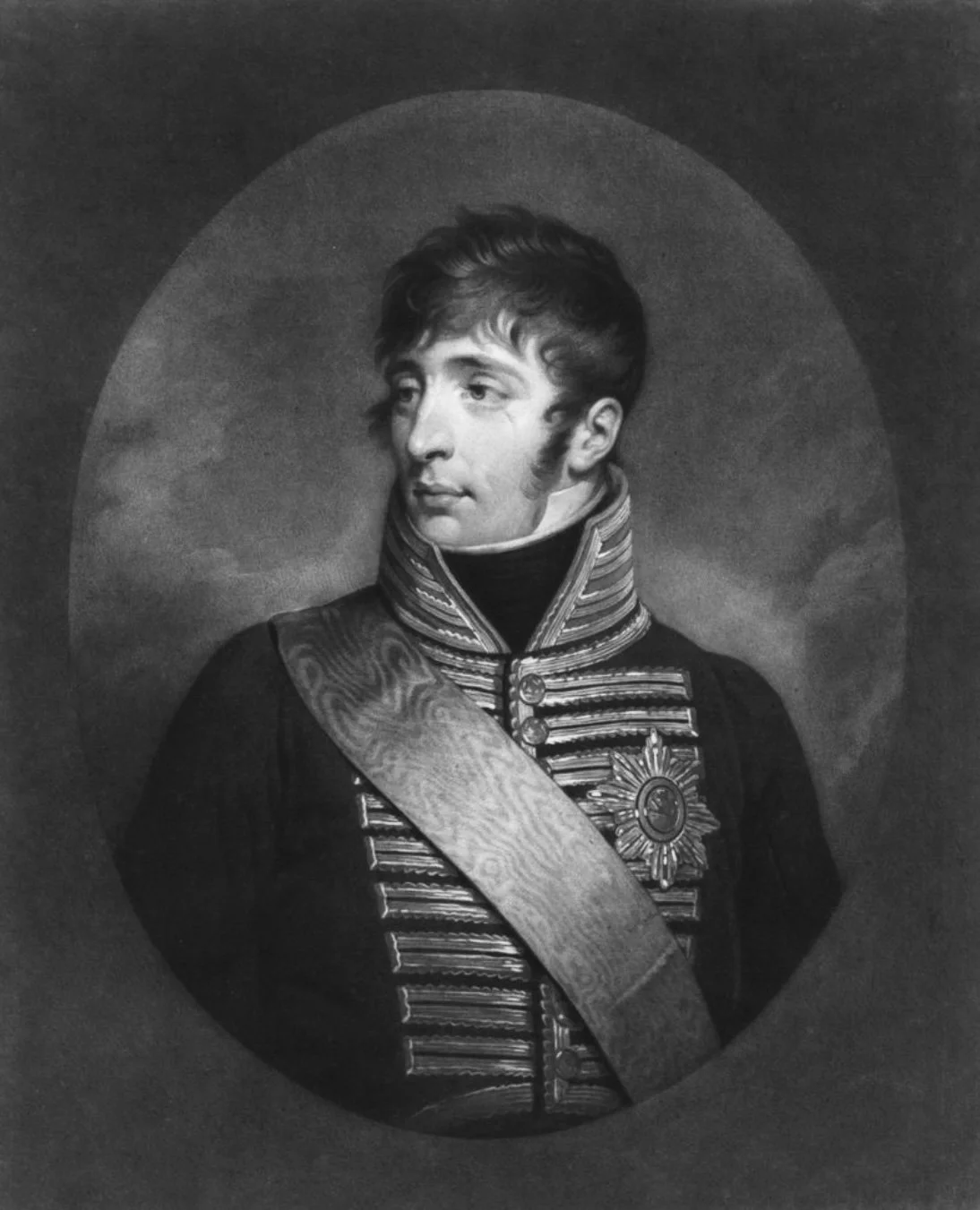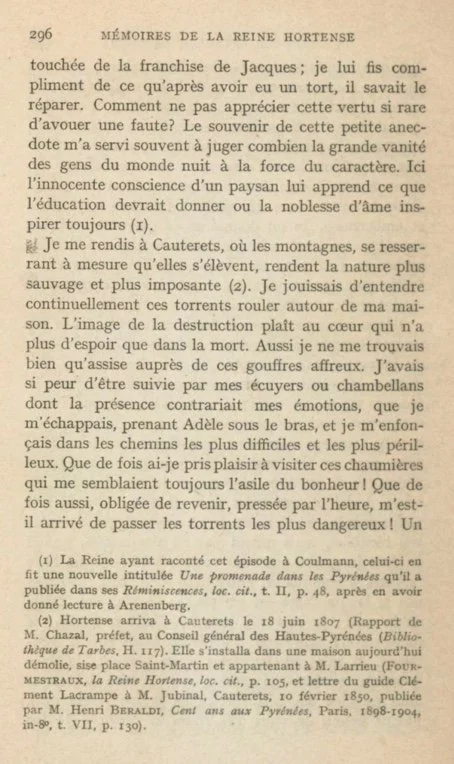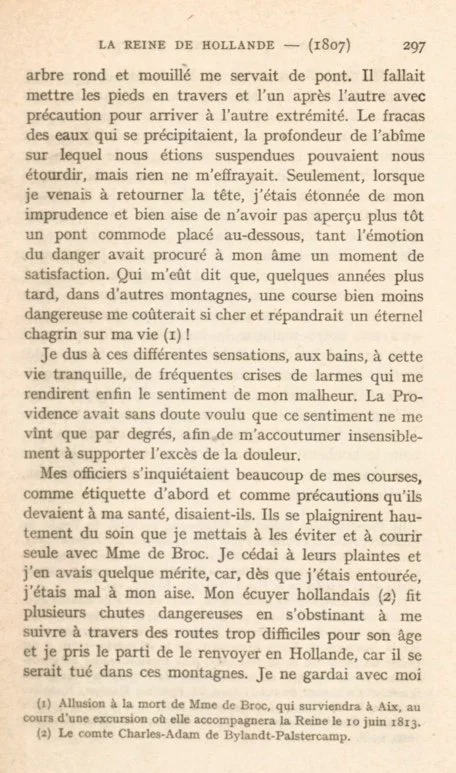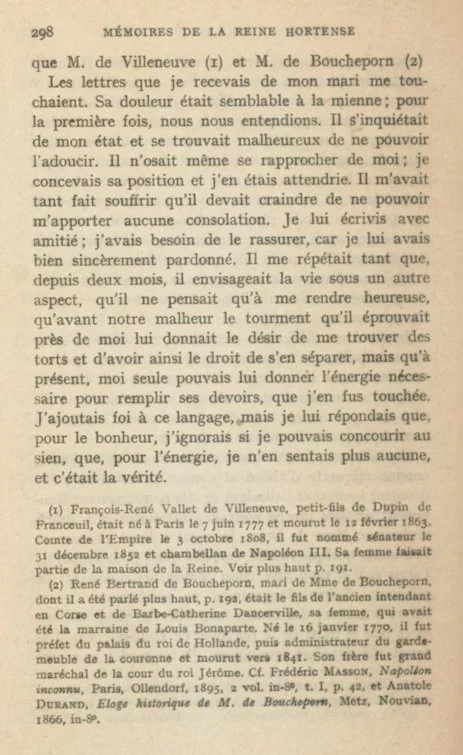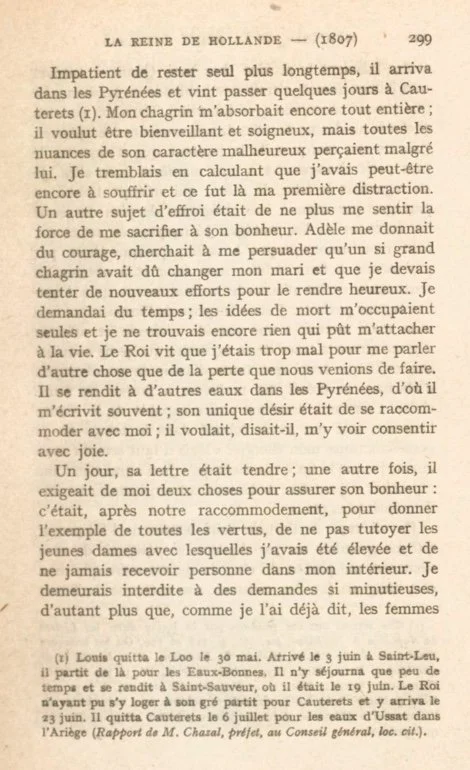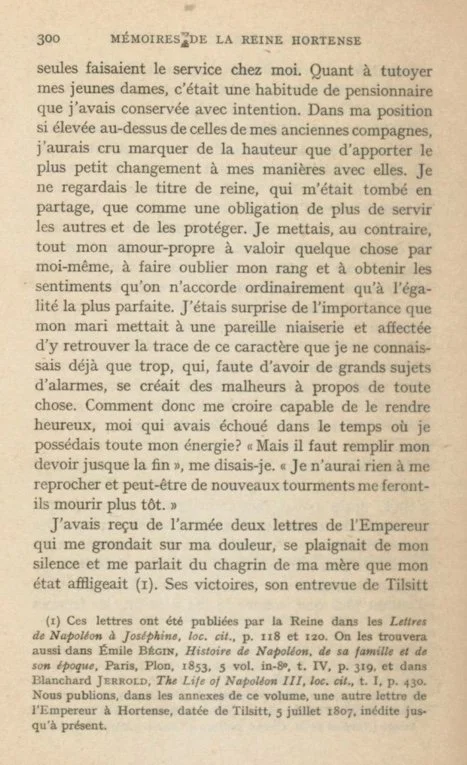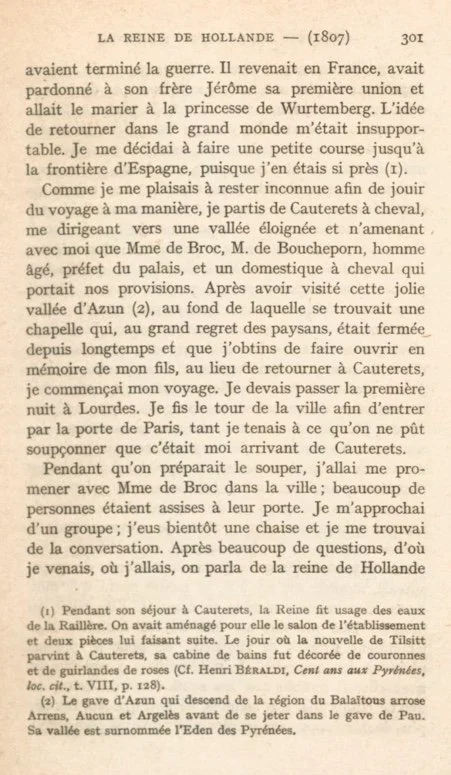Let’s have another look at Hortense’s Memoirs. If you want to read the book it is available for free at the side bar in English and French. Use the widget on the sidebar to translate the text below into pretty much any language.
Hortense sees no value in life since the death of her son and she seeks danger for a distraction. Louis continues to draw Hortense back via typical push me/ pull you dynamics of abuse.
Hortense’s memoirs continues:
I feared to be followed by my equerries or chamberlain, whose presence would have disturbed me, and I would slip away from them. Taking Adele's arm, I would disappear down the most difficult and dangerous pathways. How often did I take delight in visiting those humble cottages, which seemed to me a refuge of happiness. How often too when the lateness of the hour compelled me to hurry back did I pick my way across perilous torrents.
The round, wet trunk of a tree served as my bridge. I had to place my feet crossways, one in front of the other, in order to reach the opposite side. The thunder of the rushing waters as they dashed down into an abyss on whose brink we stood might make us dizzy, but it could not alarm me.
Only when I looked back would I be surprised at my own temerity and at the same time rejoice not to have seen some easy comfortable bridge a little farther upstream, because the moment of danger had for an instant taken my mind off my affliction.
Who would have believed that a few years later, among other mountains, another expedition far less dangerous could cost me so dearly, and cast over my life the shadow of an eternal sorrow.
The officers belonging to my household were very much worried about my excursions, both on the ground of court etiquette and of my personal health, which, they explained, they were supposed to safeguard. They complained openly about the pains I took to avoid their company and the way I went off alone with Madame de Broc.
I yielded to their wishes and deserved credit for doing so, as whenever I found myself surrounded by people, I felt physically ill at ease. My Dutch equerry had several bad falls because he insisted on following me over paths that were too difficult for him at his age, and I decided to send him back to Holland, for he would have ended by killing himself on these mountain roads. I only kept with me Monsieur de Villeneuve and Monsieur de Boucheporn.
I was touched by the letters my husband wrote me. His grief seemed to equal mine. For the first time we understood one another. He was worried about my health and thought it unfortunate that he could find no way to improve it. He did not dare to come to see me, and I was affected by his attitude. He had caused me so much pain that presumably he did not believe he could prove a consolation for me. I wrote him in a friendly manner, for I had sincerely pardoned his past faults. He kept repeating to me that in the last two months he had come to see life from a different angle, that he was anxious to make me happy, that the torments he had suffered previous to our misfortune when we were living side by side were what had made him wish to find me guilty of some fault so as to have the right to ask for a separation, but that now it was I, and I only, who could give him the necessary courage to perform his various duties. In the end I was touched. I believed his statements.
Nevertheless, I replied that as far as happiness was concerned, I was not sure whether I could give him that. As for courage I had none of my own. This was the truth. Impatient at having been left alone for such a long time Louis finally came to the Pyrenees and spent a few days at Cauterets. I was wholly absorbed by my grief.
My husband wished to be kind and attentive, but all the defects of his nature came to the surface in spite of his efforts. I trembled at the thought of having again to suffer from his behavior, and this terror was the first thing to take my mind off my loss. Another reason for my alarm was the fact that I did not feel strong enough to sacrifice myself to his pleasure.
Adele encouraged me. She tried to persuade me that our common sorrow had altered my husband's character and that I should try again to make him happy. I felt that to do so would take time. For the present I was absorbed in gloomy thoughts and I had not as yet found anything that tempted me back to every-day life. The King realized that I was still too ill to think about anything except the loss we had so recently suffered. He went to another watering-place in the Pyrenees, from which he wrote me frequently.
His only wish was to effect a reconciliation between us. He declared he would be overjoyed if I would consent to such an arrangement. Some days his letters would be affectionate; on other occasions he insisted on two things as being essential to his peace of mind.
One was that after our reconciliation, in order to be an example of all domestic virtues, I should never speak in a familiar manner (tutoyer) to my young ladies with whom I had been brought up; the other was that I should never receive anyone in my private apartments.
These conditions amazed me. For one thing, as I have already said, only women waited on me in my own rooms. As for speaking familiarly to my young ladies, it was a habit I had formed at boarding-school and had kept up intentionally in view of my rank, which placed me so far above my companions.
I should have felt I was behaving in an unduly haughty manner if I had changed in any way my attitude toward them. I considered the title of Queen, which had happened to fall to me, entailed only an obligation to do more for others and protect them. Indeed, I made every effort to prove that I had some personal merit of my own, to make people forget my rank and to gain that affection which is generally bestowed only on those whom we consider our equals in every respect.
I was surprised at the importance my husband attached to such a trifle. His attitude seemed to reveal those traits which I already knew only too well, for instance his habit of taking offense at the least thing when he could not find serious cause for alarm. How was it possible to believe I could make him happy in my present state of mind and body, since I had failed to do so in the days when I had all my health and strength. "But I must do my duty to the bitter end," I said to myself.
“I do not want to have anything to blame myself for, and perhaps new sorrows will hasten my death." I had received two letters written by the Emperor while at the front. In them he reproached me for my grief, complained of my silence and spoke of the sorrow my condition caused my mother. His victories and the conference at Tilsit having ended the war he returned to France and pardoned his brother Jerome whom he was about to marry to the Princess of Württemberg.
The idea of going out into society was intensely disagreeable to me, and I decided instead to make a little trip as far as the Spanish border since it was so near. As I enjoyed traveling incognito, in order to be able to do as I pleased, I left Cauterets on horseback in the direction of a distant valley.
The original French is available below:




